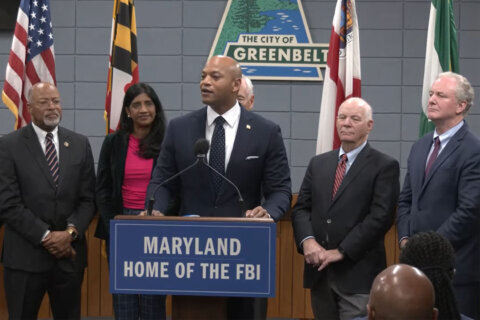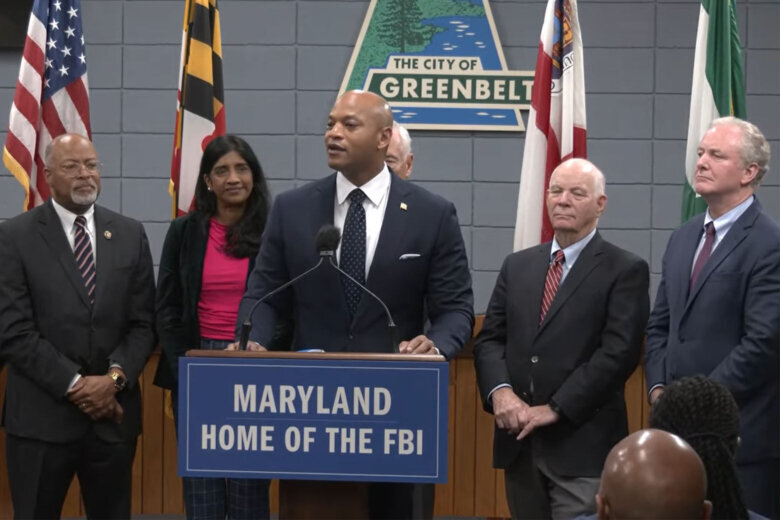
When word got out that federal officials had chosen Greenbelt, Maryland, to be the new home of the FBI’s headquarters, criticism came fast and furious from both leaders in Virginia and leaders in the FBI.
While government officials in Maryland are celebrating the decision to locate FBI’s new headquarters in Prince George’s County, the General Services Administration is also defending its decision with newly-released documents showing agency leaders had been going back and forth about those same criticisms with FBI leaders for several weeks.
Md. leaders hail a ‘transparent process’
In a news conference Friday, government leaders in Maryland responded to some of the criticism about the site selection, while celebrating what they called a win based on merits — not politics.
“We have always known that we won on the merits,” Maryland Gov. Wes Moore said. “And actually, that’s not just true now. That was true over a decade ago, when the process began.”
Rep. Steny Hoyer, the former House majority leader, said: “The FBI needed site in the region that was secure, affordable and accessible, one suitable for the bureau’s crucial work. With that goal in mind, the GSA conducted a thorough, transparent and objective site selection process.”
“The GSA did what was right,” Maryland Sen. Ben Cardin said during the conference. “It was a transparent process.”
Maryland officials claim the Greenbelt site saves money for American taxpayers compared to the other potential site considered by GSA — a plot of land in Springfield, Virginia.
“There’s over a billion reasons that it should be here in Greenbelt as opposed to Springfield,” said Lt. Gov. Aruna Miller, claiming that the Greenbelt choice is “probably close to $1.5 billion in savings to the American taxpayers.”
Miller also said that the Greenbelt location, as the most transit-accessible facility in the running for FBI’s new headquarters, now has the potential to take thousands of cars off the road.
On Thursday, a bipartisan group of Virginia officials, including Democratic Sens. Mark Warner and Tim Kaine and Republican Gov. Glenn Youngkin — issued an indignant statement, pointing to an “irrevocably undermined and tainted” process and saying the decision “must now be reversed.”
Warner has also called for an inspector general investigation.
At the news conference Friday, Maryland officials rejected charges of interference, and suggested there would be no do-overs.
“This is done,” Hoyer said. “An objective reading of all the facts led to the selection.”
Conflict of interest?
The Maryland news conference came after debate over the move ramped up Thursday with FBI Director Christopher Wray telling employees he was concerned about a “potential conflict of interest” in the site selection.
According to documents released Thursday, about a month before the public announcement of the headquarters move, the FBI first expressed concerns about the role that GSA official Nina Albert played in making the final decision — and whether her past employment with the Washington Metropolitan Transit Authority served as a conflict of interest.
WMATA owns the land in Greenbelt selected by the federal government for the new FBI headquarters.
Between 2016 and 2021, Albert was in charge of WMATA’s real estate holdings before taking a job with GSA that put her atop the federal government’s real estate portfolio. The job as the GSA’s Commissioner of the Public Buildings Service also meant she had oversight of construction and maintenance of federal properties nationwide.
In an Oct. 12 letter, the bureau asked the GSA to conduct a legal review of Albert’s role in the process. On Nov. 3, GSA delivered the bureau a six-page response addressing the claims that have since been aired publicly.
“Our office has concluded that the concerns raised in the Letter do not provide GSA with sufficient legal justification to question the legitimacy of the site selection process,” said the statement written by GSA General Counsel Alex DeMots. It goes on to outline that the panel tasked with recommending a site offers just that — a recommendation — and that the Site Selector Authority (SSA), in this case Albert, “is vested with the authority to make the site selection decision ‘regardless of the recommendation provided by the Panel.’”
In defending its decision, GSA also posted documents Thursday showing that a five-person panel tasked with winnowing down a long list of potential sites had voted unanimously in 2013 to not only include Greenbelt and Landover on the list of finalists, but that it unanimously recommended to exclude the Springfield site from the list.
The panel also voted 3-2 to recommend a USDA site in Beltsville be considered. Ultimately, the SSA for GSA at that time discarded the recommendation against Springfield and added it to the list of finalists, while choosing to exclude the Beltsville site.
The memo then concluded by saying that there was no legal justification for overturning Albert’s decision, though not before strongly dismissing the conflict of interest argument:
“It is worth stressing that, as a public official, there is a strong presumption that Ms. Albert acted in good faith. In the absence of clear evidence to the contrary, public officers are presumed to have properly discharged their official duties,” the memo said. “Moreover, as the limited authorization indicates, WMATA is a government agency, not a private company — and her participation in this matter should be understood in that context. We have found nothing in the record, let alone the “clear evidence” required under the law, to suggest that Ms. Albert did anything but carry out her duties and responsibilities as set forth in the SSP in good faith.”
Last month, Albert left GSA to become D.C.’s Deputy Mayor for Economic Development and Planning.
In other documentation published on Thursday, GSA said the cost to the federal government to build the Greenbelt site would be $26.2 million, compared to $64.1 million to build in Springfield and over $100 million to build at the Landover site.
Other documents also showed that the federal government valued the land at the Landover site, where the Landover Mall used to sit, at a little less than $22 million, but that the asking price was over $71 million.








